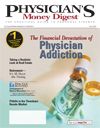Close-up: Money Market Accounts
Money Market Accounts: n. Federally insured accounts, with banks and other financial institutions, that pay rates established by the bank based on money-market yields. Money market mutual funds are similar but they are not federally insured.
How many times have you opened a checking or savings account? Probably more times than you'd care to remember, especially if you've relocated several times during your life.
But what about opening a money market account instead? They're similar to a regular savings account, except that in most cases they pay a higher interest. They're also similar to checking accounts in that you can write checks from your money market account. However, before you run out and open a money market account, there are a few important things you should know.
The Ins and Outs
Money market accounts may be opened through banks or credit unions. Accounts opened through a bank are insured by the Federal Deposit Insurance Corporation (FDIC), just like a savings account. Credit unions insure money market accounts through the National Credit Union Administration, which is a federal agency. Either way, your money is safe if the bank or credit union goes out of business.
Interest rates can vary from one money market account to another, so it's best to shop around. The interest on money market accounts is usually compounded daily and paid monthly, and the more money you have in your money market account, the higher the interest rate. That's a good incentive for saving because money market accounts work just like savings accounts in that you can make regular deposits.
There are, however, some caveats. Most money market accounts require a higher minimum balance than the average savings account, and there are usually limits to how many withdrawals you can make each month. Most banks or credit unions allow between three and six withdrawals each month, and could charge a $5 or $10 fee for every withdrawal made above the limit. Some banks will allow you to make unlimited deposits and withdrawals from ATMs in their network without a fee.
You can also write checks from most money market accounts. But here, again, there's a limit on how many checks you can write each month, and a fee if you write more than the maximum.
Consider the Options
If you're considering opening a money market account, keep in mind that there are different types available: a basic account, a tiered account, and a package deal.
A basic account is just that, and like a savings account, requires nothing more than a minimum opening deposit of approximately $100.
If you have more money to work with, you could consider a tiered account. A greater minimum opening deposit is required, but the interest rate increases as does the account balance. Writing for Bankrate.com, Michelle Samaad points out that a money market account with a $500 balance might earn 2% interest, whereas an account with a $50,000 balance could reap as much as 5% interest.
Lastly, some banks offer package deals that pair money market accounts with savings accounts, CDs, or other products the bank might feature. Slightly higher interest rates may accompany these types of packages, and minimum deposits in the money market account are sometimes waived as well.
POP QUIZ
1. Money market accounts and money market mutual funds are both federally insured. True or False?
a) True b) False
2. How many free monthly withdrawals do money market accounts usually allow?
a) Between 2 and 4
b) Between 4 and 8
c) Between 3 and 6
d) Between 8 and 10
3. Types of money market accounts include
a) Basic account
b) Tiered account
c) Package deal
d) All of the above
4. The interest rate on a money market account may vary based on what:
a) Account balance
b) Number of monthly deposits
c) Number of monthly withdrawals
d) How well you know the bank teller
5. Money market accounts allow you to write a certain number of checks each month. True or False?
a) True
b) False
Answers: 1) b; 2) c; 3) d; 4) a; 5) a.
